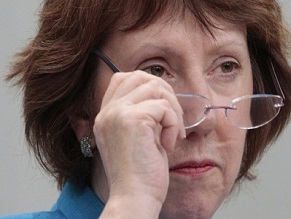|
World Jewish News

EU foreign policy chief embarked on a visit to Rabat, Morocco Monday, as part of a trip that will also take in Tunis, Tunisia, as she commits the EU’s continued “strong support to the reform progress” in the North African countries
|
EU’s Ashton travels to Morocco and Algeria as she praises ‘encouraging’ reforms in the North African countries
06.11.2012, Israel and the World EU foreign policy chief Catherine Ashton embarked on a tour of Morocco and Algeria Monday as she professed herself “encouraged” by democratic progress in the two North African states and committed the EU’s continued “strong support to the reform progress”.
Arriving in Rabat on Monday, Ashton was scheduled to meet with Prime Minister Abdelilah Benikrane and Foreign Minister Saad-Eddine El Othmani, before travelling on to Algiers Tuesday to meet with Algerian government representatives, where she is to sign three EU-Algeria financing agreements pertaining to the protection of cultural heritage, support for reforms in transport and youth unemployment.
Underlining the European Union’s commitment to maintaining close political and economic ties with the geographically important countries, in the wake of last year’s popular uprisings in neighbouring Tunisia and Libya, the foreign policy chief released a statement ahead of leaving Brussels for the region admitting her hopes of discussing “wider regional issues...where we have a mutual interest in working together”.
Morocco became the first Arab country to claim the rights to a dedicated summit for the EU, following the signing of the Lisbon treaty, which in turn established an EU-Morocco Association Agreement in 2000. A European Neighbourhood Policy Action Plan followed in 2005, in addition to a joint document on advanced status in 2008, however negotiations on a bilateral readmission agreement came to a halt in May 2010, following EU concerns regarding migration, mobility and security.
Ashton’s statement, however, hinted at a renewed partnership between the EU and Morocco Monday, when expressed hopes to “reinforce the excellent progress we have made in the recent past”.
Last year the EU welcomed parliamentary elections which placed the Islamist former opposition Justice and Development party (PJD) in pole position, describing it as "an important step in the on-going process of democratic reform initiated by the King to respond to the demands and aspirations of the Moroccan people". Ashton and EU Integration Commissioner Stefan Fule called for the new government to usher in “the swift and effective implementation of these comprehensive reforms” across political, economic and social spheres.
Morocco enjoys a long-standing rich Jewish history and, unlike neighbouring Tunisia is seen as a comparatively safe haven for its 3,000-strong Jewish community today. In 1930, prior to the creation of Israel, approximately 225,000 were living in Morocco, the largest North African Jewish population. Whilst Morocco protected its Jewish community from Nazi legislation during WWII, an emerging anti-Semitism came into being after the declaration of the State of Israel in 1948, which led to a mass aliyah (emigration to Israel), which further increased following Moroccan Independence in 1956.
French colonisation of Algeria in 1830 helped protect its indigenous Jewish population which had been present since the destruction of the first ancient Jewish temple, over 2,000 years previously. In the late 1930s, there were approximately 120,000 Jews living in Algeria, the majority of whom had taken up French citizenship. During WWII the Vichy administration annulled the citizenship of Algerian Jews, confiscated property and banning them from working in various professions. When Algeria gained independence in 1962, only citizens with a Muslim father or paternal grandfather were granted Algerian citizenship, which led almost 140,000 Algerian Jews to emigrate to France and, in smaller numbers, Israel. Today, there is no remaining Jewish community in the country.
EJP
|
|
